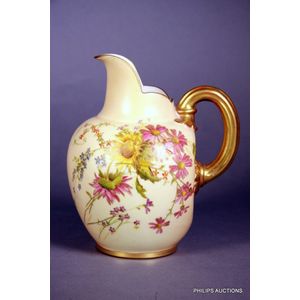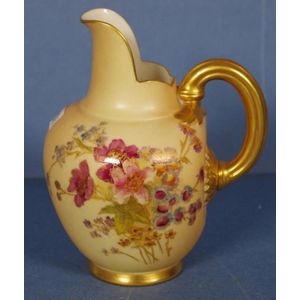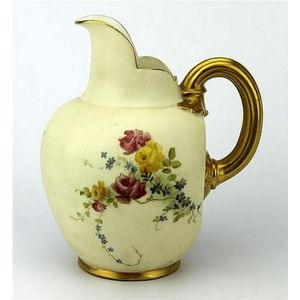Royal Worcester Spring Flower Pitcher
You must be a subscriber, and be logged in to view price and dealer details.
Subscribe Now to view actual auction price for this item
When you subscribe, you have the option of setting the currency in which to display prices to $Au, $US, $NZ or Stg.
- Ivory - Ivory is a hard white material that comes from the tusks of elephants, mammoth, walrus and boar, or from the teeth of hippopotamus and whales. The ivory from the African elephant is the most prized source of ivory. Although the mammoth is extinct, tusks are still being unearthed in Russia and offered for sale.
Ivory has been used since the earliest times as a material for sculpture of small items, both in Europe and the east, principally China and Japan.
In Asia ivory has been carved for netsuke, seals, okimono, card cases, fan supports, animals and other figures and even as carved tusks.
In the last 200 years in Europe ivory has been used to carve figures, for elaborate tankards, snuff boxes, cane handles, embroidery and sewing accessories, in jewellery and as inlay on furniture. Its more practical uses include being used for billiard balls, buttons, and a veneers on the top of piano keys.
The use and trade of elephant ivory have become controversial because they have contributed to Due to the decline in elephant populations because of the trade in ivory, the Asian elephant was placed on Appendix One of the Convention on International Trade in Endangered Species (CITES), in 1975, and in January 1990, the African elephant was similarly listed. Under Appendix One, international trade in Asian or African elephant ivory between member countries is forbidden. Unlike trade in elephant tusks, trade in mammoth tusks is legal.
Since the invention of plastics, there have been many attempts to create an artificial ivory - Registered Numbers - Between 1842 and 1883, a diamond- shaped mark was used to identify items as British-made, which classified the item according to the material from which it was manufactured, as well as the date of registration. This system was discontinued in 1884 when a numbering system was introduced.
Design registration is for "what and item looks like", and is not a patent ("how something works") or trade mark ("what it is called").
The registered number is usually on an under-surface of an object (on the base of ceramics) and oftern shown as "Rd. No. 99999", sometimes surrounded by a rectangular box.
The table below lists the year, and the first registered number for that year:
1884 1
1885 18,993
1886 39,547
1887 61,207
1888 87,266
1889 111,664
1890 140,481
1891 160,613
1892 183,259
1893 203,348
1894 223,861
1895 244,726
1896 266,237
1897 288,848
1898 309,956
1899 328,527
1900 349,120
1901 367,628
1902 380,979
1903 401,944
1904 422,489
1905 428,004
1906 469,160
1907 486,464
1908 516,375
1909 533,561
1910 546,084
1911 561,570
1912 585,707
1913 608,541
1914 627,887
1915 642,613
1916 651,079
1917 655,001
1918 662,576
1919 665,728
1920 664,869
1921 676,491
1922 685,412
1923 691,571
1924 695,944
1925 705,943
1926 716,386
1927 723,430
1928 725,899
1929 740,459
1930 741,336
1931 757,945
1932 767,110 - Flatback - As the name indicates, flatback Staffordshire figures are characterized by their undecorated flat backs and are typically designed to be displayed to sit on a narrow mantlepiece. They often made in pairs and depict popular scenes or characters from literature, mythology, or history, and they were prized for their intricate details and bright colours.
These figures were popular in England during the 19th century, and they were widely produced and sold by a number of different Staffordshire based manufacturers.
In the late 1880's to the early 1900s Royal Worcester also manufactured a series of floral decorated jugs which are termed 'flat backs'. - Ewer / Pitcher - A type of jug with a narrow neck bulbous body and wide spout, originally used for carrying and storing liquids such as water or wine. In medieval times they were the source of water to wash ones hands during and after a meal. later the shape was used for vessels in silver, gold, glass and ceramics.
In Victorian times they were made in ceramics and occasionally glass with a matching basin, and sometimes other accessories such as a soap holder or toothbrush holder. Their purpose was to provide facilities for personal washing In the early 19th century were often enclosed in purpose built stands, and later resided on a washstand..
Sometimes the words "ewer" and "pitcher" are used interchangably, but a pitcher is generally considered to be a jug, and would have a wide mouth, and a gently tapering body.
This item has been included into following indexes:
-
Royal Worcester (England), item types
- jugs & ewers 349
- other 3,563
Visually similar items

A Royal Worcester flatback jug. 1895, pattern 1094, the globular jug with a ribbed gilded handle and foliate mounts, decorated with floral sprays in muted tones with subtle gilt highlights upon an ivory ground; with puce backstamp and registration number u

A Royal Worcester jug, adorned with dainty bulbous poppy bouquets on blush ivory ground and heightened in gilt. Date code 1891. Height 13 cm

A Royal Worcester flatback jug, 1901, pattern 1904, the ovoid jug decorated with sprays of blooms with gilt enrichments upon a blush ivory ground, and having a fluted loop handle with moulded floral mounts in shot gilt colours, green backstamp underside an

Royal Worcester blush ivory porcelain jug, height 13.5 cm
